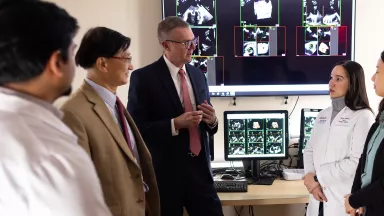Arrhythmogenic Cardiomyopathy
As part of an academic health system, Montefiore Einstein Center for Heart and Vascular Care supports the mission and guidelines of the U.S. Department of Health and Human Services (HHS). The following information is provided by HHS.
Types of Cardiomyopathy
Hypertrophic Cardiomyopathy
Hypertrophic cardiomyopathy is very common and can affect people of any age. Hypertrophic cardiomyopathy affects men and women equally, and about 1 out of every 500 people has the disease.
Hypertrophic cardiomyopathy happens when the heart muscle enlarges and thickens without an obvious cause. Usually the ventricles, the lower chambers of the heart, and septum (the wall that separates the left and right side of the heart) thicken. The thickened areas create narrowing or blockages in the ventricles, making it harder for the heart to pump blood. Hypertrophic cardiomyopathy also can cause stiffness of the ventricles, changes in the mitral valve, and cellular changes in the heart tissue.
Dilated Cardiomyopathy
Dilated cardiomyopathy develops when the ventricles enlarge and weaken. The condition usually starts in the left ventricle and over time can affect the right ventricle. The weakened chambers of the heart don’t pump effectively, causing the heart muscle to work harder. Over time, the heart loses the ability to pump blood effectively. Dilated cardiomyopathy can lead to heart failure, heart valve disease, irregular heart rate, and blood clots in the heart.
Restrictive Cardiomyopathy
Restrictive cardiomyopathy develops when the ventricles become stiff and rigid but the walls of the heart do not thicken. As a result, the ventricles do not relax and don’t fill with the normal blood volume. As the disease progresses, the ventricles do not pump as well and the heart muscle weakens. Over time, restrictive cardiomyopathy can lead to heart failure and problems with the heart valves.
Arrhythmogenic Right Ventricular Dysplasia
Arrhythmogenic right ventricular dysplasia is a rare type of cardiomyopathy that occurs when the muscle tissue in the right ventricle is replaced with fatty or fibrous tissue. This can lead to disruptions in the heart’s electrical signals and causes arrhythmias. Arrhythmogenic right ventricular dysplasia usually affects teens or young adults and can cause sudden cardiac arrest in young athletes.
Unclassified Cardiomyopathy
Other types of cardiomyopathy are grouped into this category and can include:
- Left ventricular noncompaction happens when the left ventricle has trabeculations, projections of muscle inside the ventricle.
- Takotsubo cardiomyopathy, or broken heart syndrome, happens when extreme stress leads to heart muscle failure. Though rare, this condition is more common in post-menopausal women.
Syndicated Content Details:
Source URL: http://www.nhlbi.nih.gov/subscribe/4042
Source Agency: National Heart, Lung, and Blood Institute (NHLBI)
Captured Date: 2016-03-14 20:09:00.0





